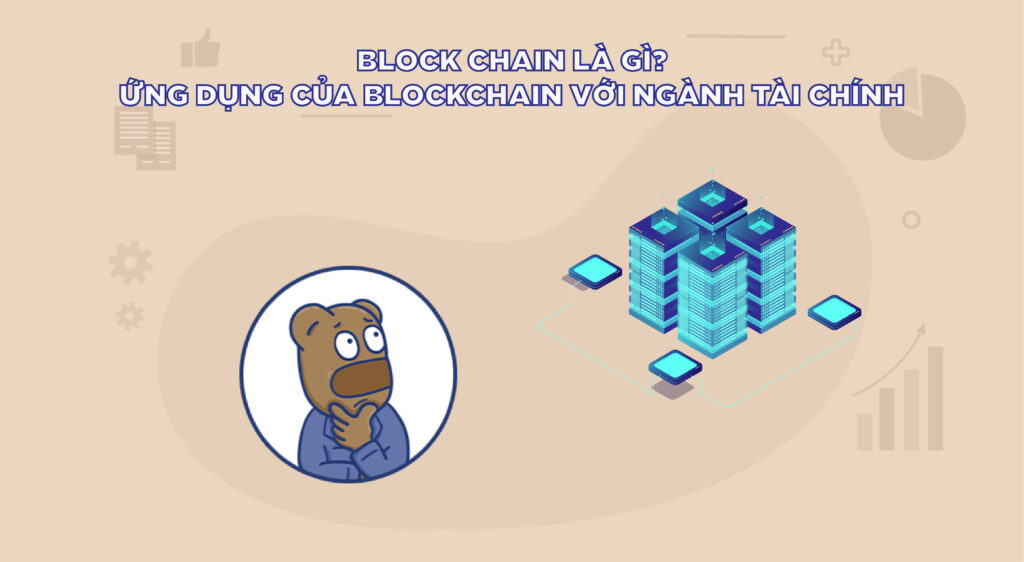In the age of digital transformation, the question of what is blockchain is no longer strange to programmers and digital lovers. Most investors know about blockchain through the Bitcoin electronic money system. Today, blockchain has shown its great multitasking for the finance and accounting industry. This is also an effective assistant to help store the most optimal information that humans have created. So, what is blockchain? What does that mean for the financial industry? Join op10mmo.vn to follow today’s topic.

What is Blockchain?
Blockchain is a decentralized database that stores information, linked by encryption in the blockchain. The initialization time is stored inside each block of information and is previously linked. This technology was born to prevent unreasonable data changes.
With a byzantine fault-tolerant system (computer science problem about reliable transmission, error handler in a distributed system), blockchain is the best solution for things like: Recording events, processing transaction management, records, notarization and identity verification. This minimizes the risk of data being changed in global transactions.
Information on the blockchain cannot be changed unless there is a consensus of the system nodes. Even if one part of the system goes down, other nodes will still work to protect the information.
What are the advantages and disadvantages of blockchain?
It is impossible to create an all-powerful technology at the present time. Therefore, blockchain also has certain advantages and disadvantages.
What are the advantages of blockchain?
Blockchain is like a notebook that records all transactions that occur in the system. The advantages of blockchain include:
- Chain Accuracy: Blockchain is operated by a system of thousands of computers. This eliminates most of the human involvement in the transaction verification process. Therefore, the information will be more accurate and there will be less manual error.
- Reduced transaction costs: Blockchain completely eliminates the need for 3rd-party verification. Therefore, the costs related to notarization and transaction verification will be eliminated.
For example: When trading Bitcoin cryptocurrency is operated by the blockchain system, investors will not have to pay fees to the transaction broker.
- Decentralization: When any changes are added to the blockchain, all operating computers will be updated on the blockchain to reflect the change. This solves the problem of information tampering.
- Fast transaction: While financial investment channels take a certain time to complete the transaction. Then transactions in the investment channel in the blockchain system seem to be done instantly. This is especially useful for multinational transactions.
- Secure Transactions: With transaction information linked inside a complex encrypted blockchain. This helps to protect transaction information from unknown changes.
What are the disadvantages of blockchain?
Besides the advantages, blockchain also has disadvantages that need to be mentioned:
- Technology costs: To develop and operate blockchain, it is necessary to have computer systems working 24/24. Obviously, the cost for this system is not small.
- Risk of environmental pollution: When computer systems operate 24/24, computer energy and fuel are significantly eroded. This is also the biggest drawback of blockchain.
What is the financial industry application of blockchain?
For the financial industry, blockchain has certain meanings because of its advantages and disadvantages.
- Cross-border transactions: With the transaction speed is almost instant, while the traditional international transaction takes a lot of time. Therefore, Blockchain is the technology that banks around the world need to think about.
- Trade finance platform: In the financial sector, blockchain also has a platform to support trade. There are already many banks using blockchain to create smart contracts. It also increases sponsorship efficiency and opens up new revenue opportunities.
- Clearing: Blockchain’s ability to accurately record data could replace current clearing and settlement procedures. If applicable, transactions will be optimized in terms of time and effort.
- Digital Identity Verification: With a blockchain-enabled ID, banks and financial institutions can easily verify information. When customer information is protected by blockchain, users’ trust in the bank will increase significantly.
- Credit Reporting: It ‘s entirely possible that a credit report using a traditional server can result in a data breach. Blockchain server-based credit reports are much more secure.
Conclusion
Blockchain has the function of linking encrypted information inside the blockchain to avoid unreasonable data changes. With certain advantages, blockchain can be applied to the financial industry in the most optimal way. Hope today’s article helps you answer the question of what blockchain is and how to apply it. Follow the next article of Top10mmo.vn to get more knowledge about the financial market!






